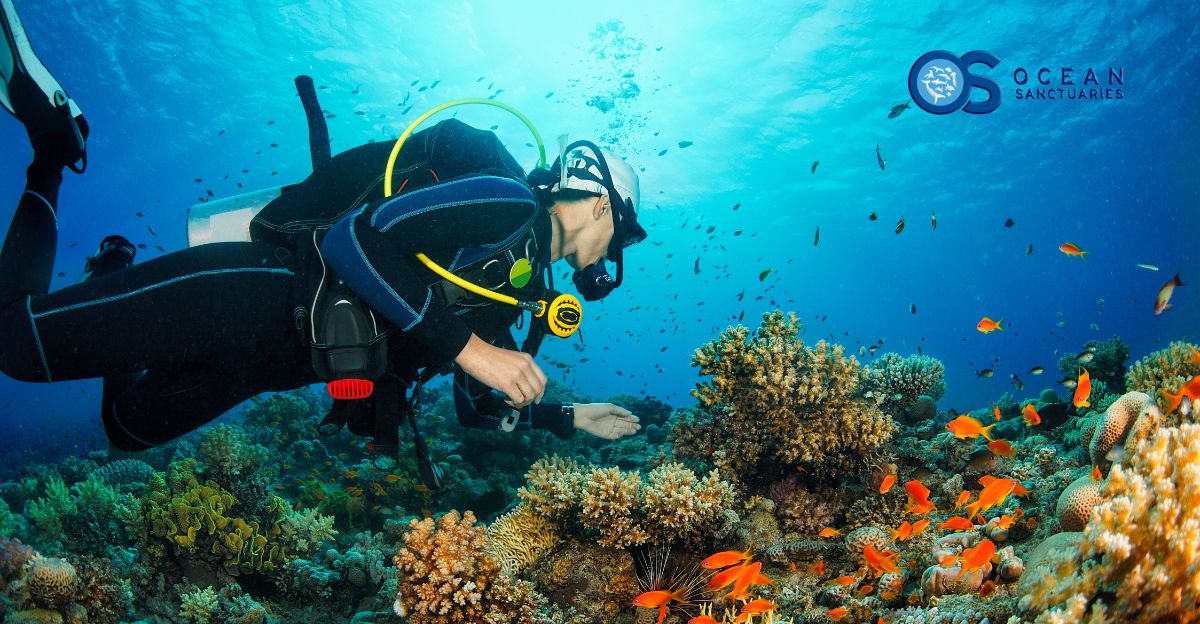Revolutionizing Ocean Data Collection: Ocean Sanctuaries Introduces AI-Powered Species Identification
San Diego, CA – 31 January, 2025 – Ocean Sanctuaries, a pioneering nonprofit in marine citizen science, is ushering in a new era of ocean conservation with the launch of AI-powered species identification. By integrating cutting-edge artificial intelligence with community-driven research, the organization is transforming how marine biodiversity is documented—making it faster, more accurate, and accessible to citizen scientists worldwide.
The new initiative utilizes Wildbook for Marine Life, an AI-driven pattern recognition system that enables divers, snorkelers, and beachgoers to contribute meaningful scientific data simply by capturing photos of marine species. This breakthrough technology ensures that every uploaded image helps track ocean life, monitor biodiversity, and inform conservation efforts on a global scale.
“We are at a crucial turning point for ocean conservation,” said Barbara Lloyd, Founder of Ocean Sanctuaries. “With AI-assisted identification, we’re not only improving the efficiency and accuracy of marine research but also empowering ordinary people to contribute to science in ways that were never before possible.”
The Power of AI in Marine Citizen Science
Traditional marine species identification requires expert knowledge, extensive fieldwork, and manual data processing—often limiting how quickly conservationists can respond to environmental changes. However, with AI-powered analysis, Ocean Sanctuaries is revolutionizing this process by leveraging machine learning to recognize and classify marine species based on unique visual characteristics.
How the System Works: From Dive to Data in Minutes
Capture – Divers and snorkelers take high-quality underwater photographs of marine species in their natural habitats.
Upload – Participants submit images to Ocean Sanctuaries’ database or the integrated iNaturalist platform.
AI Analysis – The Wildbook for Marine Life system uses advanced pattern recognition algorithms to compare images with thousands of existing records, identifying species and tracking individual organisms over time.
Verification & Contribution – Scientists and trained volunteers review the AI-generated identifications to ensure accuracy, and validated data is added to global marine biodiversity research databases.
By crowdsourcing data collection and using AI to accelerate species identification, this initiative bridges the gap between community participation and high-impact scientific research.
Tracking Key Marine Species with AI
One of the most significant applications of AI-powered identification is in monitoring Broadnose Sevengill Sharks (Notorynchus cepedianus)—an apex predator whose population dynamics are still not fully understood. Since 2010, Ocean Sanctuaries has led the Sevengill Shark Identification Project, using photographic pattern recognition to distinguish individuals based on unique freckling patterns on their dorsal sides.
With the integration of Wildbook, researchers can now automate shark identification, making it easier to track migration patterns, population health, and behavioral changes over time. This approach not only enhances conservation strategies but also helps inform policies to protect vulnerable marine species.
“With traditional methods, identifying a single shark could take weeks of manual analysis,” said lead researcher at Ocean Sanctuaries. “Now, with AI, we can process and match images in seconds—allowing us to build one of the most comprehensive databases of Sevengill Sharks in the world.”
Beyond sharks, this technology is also being used to identify and monitor nudibranchs, sea turtles, rays, and other marine life, providing scientists with crucial insights into marine biodiversity and ecosystem health.
Why AI-Powered Species Identification is a Game-Changer for Conservation
Oceans cover more than 70% of the Earth’s surface, yet much of marine life remains undocumented. Many species face threats from climate change, habitat destruction, and overfishing, but without robust data collection, scientists struggle to implement effective conservation measures.
By combining artificial intelligence, citizen science, and cloud-based databases, Ocean Sanctuaries is tackling these challenges head-on, offering three key benefits:
✅ Faster, More Accurate Data Processing – AI speeds up species identification, reducing the workload for researchers and allowing conservationists to act quickly in response to environmental changes.
✅ Expanding Public Participation – The initiative lowers the barrier for entry into marine science, enabling divers, photographers, and ocean lovers of all backgrounds to contribute meaningful data.
✅ Improving Conservation Outcomes – With more data available, scientists and policymakers can make informed decisions to protect endangered species and critical marine habitats.
“We’re harnessing the power of AI and human curiosity to build the most comprehensive marine biodiversity database ever created—one that will drive real conservation impact.”
Get Involved: Become a Citizen Scientist Today!
Ocean Sanctuaries invites divers, snorkelers, beachgoers, and marine enthusiasts to join this groundbreaking initiative. Participation is simple:
Download the iNaturalist app and join the Ocean Sanctuaries project
Take photos of marine species during dives or tide-pooling adventures
Upload images to the database, where AI will assist in species identification
Contribute to real-world conservation by helping scientists monitor marine life
For those interested in volunteering, donating, or collaborating, visit [Website Link] to learn more. Follow Ocean Sanctuaries on social media for updates, success stories, and new discoveries.
About Ocean Sanctuaries
Founded with the mission of democratizing marine research, Ocean Sanctuaries is a nonprofit dedicated to citizen science, marine conservation, and public education. Through innovative programs like AI-powered species identification, the organization is redefining how communities engage with ocean science and protecting marine ecosystems for future generations.
For media inquiries, interviews, or partnership opportunities, please contact:
Media Contact
Ocean Sanctuaries
Barbara Lloyd
Phone: +1.858.633.7305
Email: [email protected]
Website: www.oceansanctuaries.org
